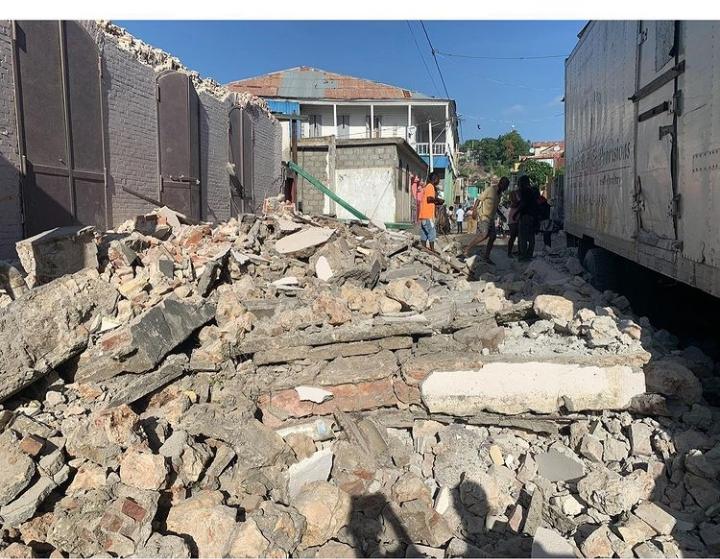

When Dr. Henri Ford first learned that his home country had been struck by yet another deadly disaster, it was difficult for him to feel anything other than despondency and dejection. But in the week following a devastating 7.2-magnitude earthquake that struck western Haiti on Saturday, Aug. 14, the University of Miami Miller School of Medicine Dean and Port-au-Prince native quickly shifted his focus to the resilience of the Haitian people, and their desperate need for aid.
“We know that wherever there is hope, then there is the certainty that we will emerge victorious, and that’s what always amazes me about the Haitian people,” said Ford, who has helped facilitate Zoom calls with nongovernmental organizations and Haitian officials in order to get essential medical supplies to the regions most in need. “They never lose hope, there is never a sense of despair, even in the face of such a severe calamity.”
The natural disaster has affected over 1.2 million Haitian inhabitants, mostly in the southern region of the island, with many living out of tents due to the destruction of their homes. With over 2,000 deaths and 10,000 injured in a country sorely lacking medical supplies and health care practitioners, the growing need for aid has led to fights over essential supplies.
Ford and Dr. Barth Green, the Miller School of Medicine Executive Dean for Global Health and Community Service, have worked on behalf of the medical school’s Global Health Institute to mobilize resources and execute a coordinated relief effort to help those affected.
“We are working to make sure that our efforts are well coordinated with those of the Ministry of Health and the Ministry of Planning to prevent unnecessary duplication and to ensure that whatever help is delivered is destined for the regions most affected and the people that are the neediest, which was a problem after the 2010 earthquake and again after Hurricane Matthew five years ago,” Ford said.
Ford went on to list various essential supplies which, he said, the Haitian government would like the University of Miami, through the Global Health Institute, to coordinate the contributions of non-profit organizations to ensure that there is no duplication or deficiency of aid in the neediest regions, which Ford said was a problem during the country’s response to the 2010 earthquake.
The efforts of the Global Health Institute are primarily focused on supplying Haiti with medical resources, Ford said, including antibiotics, intravenous solutions, painkillers, anesthetics and various other tools and medications.
Ford previously provided medical support after the 2010 Haiti earthquake, and has since performed numerous surgeries in Haiti, including the country’s first ever successful separation of conjoined twins in 2015.

In his efforts to contribute to the Haitian recovery movement, Ford has been motivated not only by the overwhelming need for supplies, but also by the character and bravery of his home country’s population.
“I think that hope comes from the genetic makeup of the Haitian. I think that’s part of what defines who you are, because from infancy to adulthood, you never seem to cease to face calamity, but you have to have the resiliency to continue,” Ford said. “This is why I remain undaunted, even facing what seems to be a terrible prognosis, because resilience is part of the fabric of the Haitian people. It is absolutely intrinsic to their DNA, so that’s why we don’t give up, we don’t give in and we never quit.”
Other students and faculty at the University of Miami with ties to Haiti have spent the days since the earthquake, which had a higher magnitude than the 2010 7.0-magnitude earthquake that is widely believed to have killed over 200,000 Haitians, wondering how one country could withstand so many tragedies.
“I was shocked and sad that we really have to go through event after event and that people are suffering on different fronts. It’s not just socio-politically and economically but environmentally as well,” said Laura Francois, a senior majoring in Public Health and French and the co-president of Planet Kreyol, UM’s Haitian student organization.
After overcoming momentary disbelief upon learning of the disaster, Francois, whose family immigrated to the U.S. before she was born, worried both for the safety of her family members in the country and the rest of the Haitian population.
“It’s sad the way that I live in safety and I can’t fathom my own immediate family out there living in the same conditions,” she said. “It seems like an endless cycle and it’s disheartening to hear people that you love, even if it’s people that I don’t know but share a culture with, suffer,”Francois said.
Other student members of the Haitian diaspora, like Veroneeka Dorval, a senior majoring in health sciences and criminology and the co-president of Planet Kreyol, have spent the last week grieving with their family.
“I was in Washington DC in a hotel room and my mom started crying,” Dorval said. “If you have any Haitian friends or peers, just ask if they’re okay. Words of encouragement are really important right now.”
Irwin Stotzky, a UM law professor who has represented Haitian refugees in cases centered on various human rights issues, says he felt similarly shocked at the seemingly never ending pattern of tragedy endured by a single country.
“I felt sick to my stomach because nothing good ever happens in Haiti. It’s almost like someone’s put a curse on the country,” Stotzky said.





